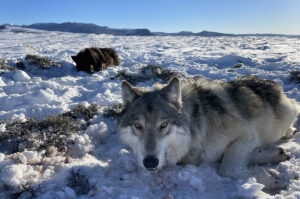
CPW placed GPS collars on two wolves in North Park on Feb. 2. Male wolf 2101 has a gray coat and is in the foreground on the right. Male wolf 2301 has a black coat and is in the background on the left.
WALDEN, Colo. – Colorado Parks and Wildlife placed GPS collars on two wolves in North Park, Colorado on Thursday, Feb. 2. The male wolf 2101 was recaptured two years after his initial capture. The other wolf collared was male 2301, presumably one of six pups produced by female wolf 1084 and male wolf 2101 in 2021.
“Both animals were caught together in an area of North Park where we have been receiving reports from the public in the past couple of weeks,” CPW Species Conservation Program Manager Eric Odell said. Odell was part of the capture team working to collar wolves in North Park this week along with CPW Wildlife Research Scientist Ellen Brandell and CPW Wildlife Veterinarian Pauline Nol. “We would like to thank the public for sending in their wolf sightings.”
CPW’s team was doing wolf capture and collaring work in conjunction with elk and moose capture efforts for ongoing research studies in the area.
“2101’s collar had failed and we could see it was damaged. Wolves are rough on collars and that’s to be expected that in time collars will fail,” said Odell.
“Refitting 2101 and having a second GPS collar will allow our biologists and wildlife managers to continue learning about the behavior of these wolves,” said CPW Acting Director Heather Disney Dugan.
During the collaring effort, a CPW-contracted company safely darted the animal with a tranquilizer from a helicopter, allowing the collar to be fitted by field staff on the ground.
“Both animals were given a health exam during the collaring process and appear to be in good health,” said Odell.
It is worth noting that, while collars provide valuable information, they only provide a snapshot and are not monitored in real time. The primary tools used by wildlife officers are field observations of physical evidence such as wolf prints and scat during field investigations to verify the presence of wolves on the landscape.
CPW also encourages the public to use its wolf sighting form if they see a suspected wolf. Any personal observations, photos or videos taken can help inform CPW staff and fill in the gaps as to wolf activity in the state.
These collaring efforts occurred on the known wolves in Jackson County that naturally migrated to the state and are not the result of wolf reintroduction efforts. No wolves have been reintroduced under Proposition 114 – now state statute 33-2-105.8.

CPW placed GPS collars on two wolves in North Park on Feb. 2. CPW’s team was doing wolf capture and collaring work in conjunction with elk and moose capture efforts for ongoing research studies in the area.

Leave a Reply